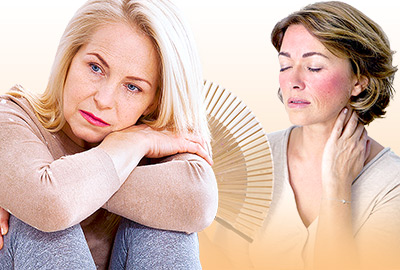When your hormone levels are fluctuating, it can cause many unpleasant symptoms, like hot flashes, night sweats, vaginal dryness, and mood swings. Any one or a combination of these can make life frustrating. Continue reading to discover things you should avoid when experiencing symptoms of hormonal imbalance in order to reduce their impact on your daily life.
If You Are Suffering From:
Hot Flashes

Try to avoid vigorous exercise. It's essential to continue a regular exercise regime during menopause, but it may be best to stick to low-impact sports such as swimming or walking. By participating in these activities you will keep your body's core temperature down while still reaping the benefits of exercise. Exercise will also help keep your hormones balanced and regulated.
Night Sweats
Try to stay away from caffeine. Not only is caffeine a culprit in aggravating hormonal fluctuation, but it can also keep you awake at night, preventing you from getting restful sleep, which is essential during menopause. If you don't want to completely give it up, try to only consume caffeine in the morning so that it is out of your system by the time you go to sleep. Also, avoid taking a hot bath or shower before going to sleep. These will effectively raise your body's core temperature and will likely trigger night sweats.
Mood Swings

Try to avoid alcohol and caffeine consumption as much as possible. They can have a cumulative impact on mood swings and may cause hormone imbalance. Alcohol is a depressant and caffeine is a stimulant, contributing to sudden spikes or drops in mood. Try drinking a fruit smoothie or decaffeinated iced tea if you're feeling parched, and keep water on hand all the time. Not only will water help keep your hormones balanced, but it will also keep your body functioning at its best.
Vaginal Dryness

Refrain from wearing tight or restrictive clothing. These items can aggravate symptoms and cause vaginal dryness to worsen. Make sure that you wear breathable clothing that will keep you comfortable instead of contributing to your symptoms. Stay away from tight jeans, and go for looser fitting clothing and pajamas. Choose fabrics that are free flowing, or that have more relaxed fits.
For more information on the symptoms of menopause and how to treat them, follow the links below.
Sources
- BMJ Group. "Menopause: What is it?" Patient Leaflet. 2007.
- Hopkins, Virginia. Lee, John R. M.D. What Your Doctor May Not Tell You About Menopause. New York: Warner Books Inc., 1996.
- Love, Susan M.D. Menopause and Hormone Book. New York: Three Rivers Press, 2003.
- Martin, Raquel. The Estrogen Alternative. Rochester, VT: Healing Arts Press, 2000.



